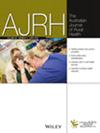Exploring Occupational Therapists Use of the Perceive, Recall, Plan and Perform Assessment When Working With Aboriginal and Torres Strait Islander Peoples in the Northern Territory
Abstract
Objective
Explore perspectives of occupational therapists on the use of the Perceive, Recall, Plan and Perform Assessment (PRPP-A) to assess functional cognition when working with Aboriginal and Torres Strait Islander peoples.
Setting
Health services in the Northern Territory.
Participants
Thirteen occupational therapists trained in the use of the PRPP-A and experienced in working with Aboriginal and Torres Strait Islander peoples.
Design
A qualitative, exploratory research design was adopted. Data were collected via focus groups, which were audio-recorded and transcribed verbatim. Each transcript was systematically reviewed using a reflexive thematic analysis approach and inductively coded. Shared meaning was identified and analysed across the data to develop themes.
Results
Five themes were identified: (1) challenges and tensions assessing cognition (knowing); (2) effectiveness of the PRPP-A in practice (doing); (3) embedding the PRPP-A in practice (doing); (4) facilitating meaningful assessment of functional cognition (being) and (5) valuing the occupational therapy role (being). Occupational therapists described a sense of knowing more about cognition after completing PRPP-A training. They described how the process of doing cognitive assessment using the PRPP-A informed clinical reasoning processes, facilitated collaboration with clients and family members, and supported the negotiation of culturally safe practice. This culminated in their occupational therapy roles being more satisfying as participants described improved alignment between their roles and their sense of occupational therapy core values.
Conclusion
The PRPP-A was found to have clinical utility and supported clinical reasoning for occupational therapists when assessing cognition with Aboriginal and Torres Strait Islander peoples in the Northern Territory.

 求助内容:
求助内容: 应助结果提醒方式:
应助结果提醒方式:


